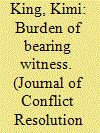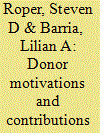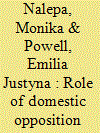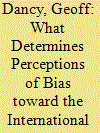|
|
|
Sort Order |
|
|
|
Items / Page
|
|
|
|
|
|
|
| Srl | Item |
| 1 |
ID:
164157


|
|
|
|
|
| Summary/Abstract |
Intersections exist regarding how institutions and individuals respond in the wake of mass violence, and we explore one theoretical perspective: resilience—the ability to overcome in the face of adversity. By controlling for the institutional context, we analyze the microlevel impact of testifying on witnesses who testify. New survey data provide information from 300 prosecution, defence, and Chambers witnesses who appeared at the International Criminal Tribunal for the Former Yugoslavia. We test propositions about resilience related to trauma, motivations, contributions to justice, fair treatment, witness fatigue, and human security. Witnesses who experienced greater trauma, who were more highly motivated, who believed they contributed to justice, and who were satisfied with their current situation were more positive about testifying. Those who believed they were treated fairly by prosecution and defence were less negative. The findings add to the debate about the burden of bearing witness in post-conflict societies and why some overcome adverse experiences related to mass violence.
|
|
|
|
|
|
|
|
|
|
|
|
|
|
|
|
| 2 |
ID:
076883


|
|
|
|
|
| Publication |
2007.
|
| Summary/Abstract |
We investigate why states provide a voluntary contribution to war crimes tribunals despite the fact that these tribunals are located in states that offer few economic and strategic advantages. We view tribunal financing as a form of foreign assistance and place the funding of tribunals within the broader foreign assistance literature to explain the motivations of donor states. We examine voluntary contributions to four tribunals, and our analysis shows that there are differences between the gatekeeper stage and the secondary decision to allocate assistance. However, donors generally make no distinction among tribunals for purposes of foreign assistance. As a consequence, purely voluntarily funded tribunals are at a disadvantage, since they are not seen by states as unique and requiring special consideration. Ultimately, the lack of funding calls into question the ability of these tribunals to provide justice to victims as well as serve as a mechanism for national reconciliation.
|
|
|
|
|
|
|
|
|
|
|
|
|
|
|
|
| 3 |
ID:
148321


|
|
|
|
|
| Summary/Abstract |
This article considers how international criminal justice administered by the International Criminal Court (ICC) affects the possibility of negotiated, peaceful transitions of power in autocracies. We argue that a strong international criminal tribunal can deter dictators’ decisions to peacefully relinquish their power. It does so when the dictator in question has faced a relatively violent opposition, one that was ready to strike a deal with the dictator promising him amnesty in exchange for stepping down. Facing an opposition that “has skeletons in its closet,” the dictator will peacefully exit his office only under a weak ICC regime. We use a cross-national time-series data set spanning 1998 to 2007 to test our theory and find that under a weak ICC regime, the more skeletons the opposition has in its own closet, the more likely is the dictator to peacefully step down from office. Interestingly, this relationship holds, to a large extent, across various levels of dictator’s culpability. If the ICC is strong, the number of skeletons the opposition has in its closet has, for the most part, no effect on the dictator’s likelihood of stepping down.
|
|
|
|
|
|
|
|
|
|
|
|
|
|
|
|
| 4 |
ID:
173138


|
|
|
|
|
| Summary/Abstract |
The International Criminal Court (ICC) has struggled with the perception that it is biased against Africans, especially in relation to its investigation in Kenya. But which Kenyans are most likely to believe the ICC is biased? Building on pluralistic models of public opinion and psychological studies, we aim to contribute to emerging research on attitudes toward international courts. We expect that group attachments will drive attitudes toward international institutions. Yet, we also theorize that exposure to violence makes individuals more likely to support international justice and reject narratives that would have the effect of insulating those who have committed crimes from being held accountable. Using new survey data from 507 Kenyans in the fall of 2015, we find support for our hypotheses.
|
|
|
|
|
|
|
|
|
|
|
|
|
|
|
|
|
|
|
|
|